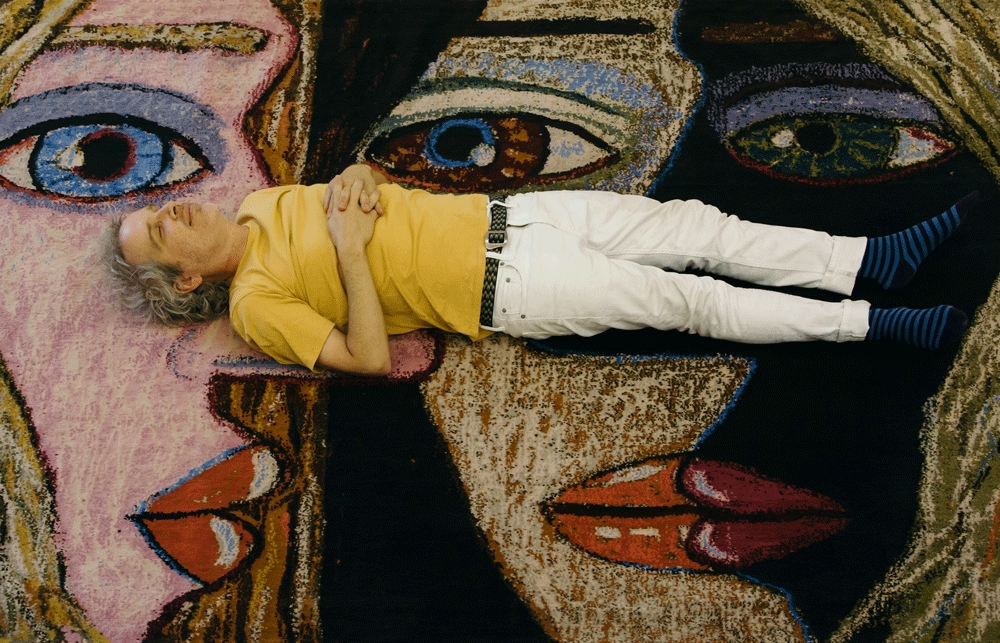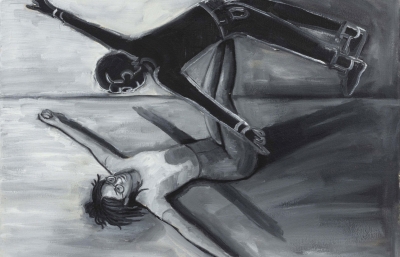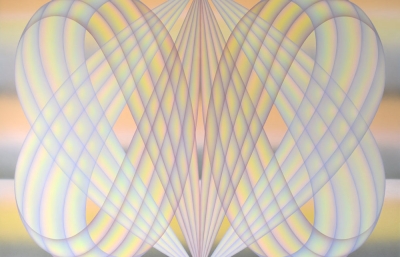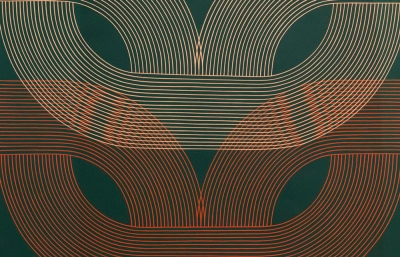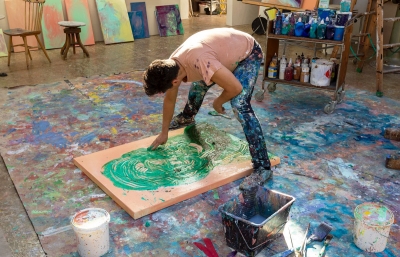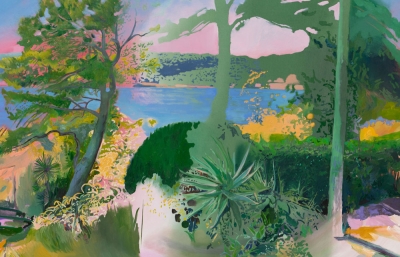Brian Calvin
The Waiting Game
Interview by Evan Pricco // Portrait by Moira Tarmy
Just before I got on the phone with Ojai, California-based painter, Brian Calvin, I wrote a little note to myself: “Bridging the gap.” I wasn’t sure how this was going to infiltrate our conversation, but subconsciously this phrase sounded perfectly in tune with the prolific artist. From his 30 years of figurative painting, his love of Philip Guston, the influence of Funk art, his continued success with solo shows around the world, to the incredible coincidence of 2020 solo exhibits in China and NYC, Calvin has built a career of bridges. His work is vibrant, constant. His evolution appears dramatic when seen from above over three decades of paintings, but each show elicits a conversation with his past and present, and that seems exactly where Calvin is most happy—in the moment. We spoke on an early fall day, as California suffered through another heat wave with fires burning north to south and east to west. The paintings for Calvin’s seventh solo show with Anton Kern Gallery, Waiting, now at the gallery’s Upper East Side location through December 5, were about to be sent to the East Coast. We spoke at length about Guston, what it means to be a California artist and how the studio still excites him.

Evan Pricco: Your year is going to bookend in an interesting way: start with a show in China and end with one in NYC. And of course, every single thing in between. But there is a reality, regardless, that something changed in your life. So what changed?
Brian Calvin: Yeah. That’s a tough one. I mean, it's true. I would say, for me, certain parts of my practice didn't need to change, but they did change. I got back from Shanghai a week or two before they locked it down. I was there in January. Everyone was planning their Chinese New Year trips, and then it all got shut down. My show there was closed for weeks. So, it feels like 2020 has just been this nonstop story. It has for everyone, of course. I came back and hit the ground running because I had other projects to work on, but there's also always a lull after putting up a show, a little depression, trying to get everything back up to snuff. And then when the shutdown happened, I mean, we have two daughters, so I stayed home out of solidarity with everyone. Just like, what the hell is this?
I cleared out a little space in the garage and started working from home. First drawing, then some painting, just working at a more intimate scale. I could have gone into my studio, and I did every now and then, but it just felt off somehow. We're all trying to figure things out. It felt off to go alone to the studio and not stay with the family. But it's funny, because then I ended up being very productive at home. It was slow going at first, but felt better than running off to the studio to adjust colors in a painting.
Which reminds me of a Philip Guston quote from 1968: “The war, what was happening to America, the brutality of the world. What kind of man am I, sitting at home, reading magazines, going into a frustrated fury about everything—and then going into my studio to adjust a red to a blue.” So certainly, for me, how can you not allow the moment to push you in some other way. I guess I was feeling that. At a certain point, I started coming to the studio a few hours every afternoon just to keep it on my mind, to know that it was still there. After some months, I had accumulated a lot of work. I knew I had a show scheduled with Anton Kern, and I gradually shifted back into the studio to translate the new work into some larger scale paintings.

It’s interesting that you bring up Guston right now, as we are in the midst of his shows being postponed. He is such a pivotal painter for so many people, and coupled with that quote, or idea, of him, in the midst of social upheaval, going to the studio feeling a bit out of touch perhaps, provokes reflection. As this year's gone on, and especially as the social activism movement was peaking, did you have moments where you were like, "What? Maybe I shouldn't be here today. Or maybe I’ll change my direction?”
There were definitely moments where I just wouldn't be here. It's strange, because you want to be able to... I think there's this human urge to make sense of things, to contribute to things, and yet, obviously another key part of this moment is reflecting and, most importantly, listening. Although things are coming out so fast that there's also a need for immediate action. I think an artist of any kind, any person, but I say artist, because you're making things, I don't know how you can't go through a slight crisis of, “What are these things I'm putting out into the world doing?”
And yet, at the same time, I firmly believe that artists don't need to deal with things directly to create these pathways for people to imagine a world that's more like what they want. So I've certainly been, I guess you'd say, wrestling or struggling with all those thoughts, not to mention the privilege of my position.
So, staying here for a moment, if we were to walk into Anton Kern this month, will there be moments where you would remember, “Oh this painting came from this moment in the summer. This one is me reacting to XYZ…” As a painter, there's an urgency to create, but also, during social change, there's urgency that's even more immediate. Do you see it yourself, these changes happening in your work as these huge moments in America are happening all around? Can you see the immediacy in your marks?
That's a good question. And I don't know how well I can truly answer that. There's so much anxiety all around, certainly within me, within my family, our communities everywhere. Obviously there is coronavirus, but then the issues around police brutality, systemic racism, economic inequity are massive. And everyone’s been simultaneously feeling kind of stuck in lockdown, which was strange because it's hard to tell whether that stuck feeling helped people really reflect on these ongoing issues? Reflect on America? It seems partially, yes.
It's funny to come back to Guston, because he is one of the artists who initially really moved me. I understood he was speaking to the times without being so direct or literal. I saw my first Guston painting in person when I was an undergraduate at Berkeley Art Museum, and they had this one really incredible painting of a few hooded men riding in a little car on the outskirts of a city. The bottom section of the painting dissolved into raw canvas as if you could just paint your way into the scene. This was around 1988, so I'd only come to know his work. I hadn't grown up really knowing anything about contemporary or modern art, except for little things I’d glean from magazines or album covers. It was so powerful, a shock to my system. I was like, wait, painting is still “a thing” and can be really connected to its moment. The references made a lot of sense to me, and yet the scale, the way it was painted made me think, "Yeah, I'd much rather do that than draw a comic."

We can talk about Guston all day. Referencing that quote and seeing his work in person reminds me that Guston's move to more figurative work was so dismissed and critically unimpressive to the critics at the time. But he has built a foundation which many figurative artists nowadays use as a reference point. I like how so many figurative artists we cover now mention Guston as, like, their gateway drug.
That makes sense. I mean, he was so formative for me. I’m thinking of that time and my experiences at Berkeley and the Bay Area in general, before the internet, when everything still felt hyperlocal. Joan Brown was a professor there, and I was seduced by both Bay Area figuration and the Funk Art legacy. When I was in high school, I had an older friend who was up at UC Davis and hipped me to William T. Wiley, Robert Arneson, Peter Voulkus. I didn’t go to Berkeley knowing anything about anything, so these people informed my reality, really, when it came to art making. They certainly opened up the larger world of art. I took T.J. Clark art history classes at UC Berkeley. There were all these incredible people and resources, and I was just a sponge.
I think, before then, my interest in art had been different. I came across Giotto and Piero della Francesca my first year in school, and those paintings resonated with me in a profound way. I’m not sure why. It's not like I saw them, these painters from 500 and 700 years ago, and thought, “I'm going to be a painter.” But then seeing those references in Guston and his ability to harness something so deep like that with this seemingly crass other stuff, too, and his beautiful movement of paint… it was just so inspiring.
And the great thing is that it looks easier than it is. So, you see his work, and you think, "Yeah. I can do that." Which is good, because it makes you try it out and you never know. You fail. You deal with the frustration. This is a huge part of trying to make images in the first place. You only ever know what you know. You make mistakes and then you learn something new. You make something that looks better than the day before, and that's exciting, especially when you're young. I still feel that way, like 30 years later.
I want to talk about the idea of being a California artist. I’m sort of obsessed with it because I’m from here and still can’t quite define it. You were born here, you live here, you went to school here: What does being a California artist mean to you?
It's a good question, and I've thought about this over the years. I don't know that I know exactly, because so much focus in the United States is on LA and New York, but so few artists in either city are originally from there. Having gone to grad school in Chicago, you got that version, too, of people from the Midwest moving to Chicago, although that always felt practical. People have more romanticized and stereotypical ideas of California and NY.
There are people who moved to California, and they really, especially in the cases of, say Hockney or Ruscha, painted an idea of California, and then they were able to really blow it out, exploit it and make amazing art, exploring and expanding the mythology of Los Angeles or Hollywood, to begin with. And, I think my sense… I never had a conceptual idea of what California meant, because it was always home base. And the Central Valley where I grew up was nothing like the California that you see in movies or on TV. So within that, I think I've always liked the idea of just trying to, on some level, let the peculiarities be part of what I do.

You've had so many shows over the years, one of my favorites being last spring in Paris at Almine Rech. I just loved the gallery and the way the works hung in such a beautiful space. Since you have had so many exhibitions, what is your pre and post-game for these kinds of bodies of work?
Drawing, really. Drawing is my daily practice. I've always got multiple sketchbooks going. I do these little thumbnails all the time. I always have one on me. If I’m out, say when my daughter is riding a horse, I'll just take a book out of my pocket and sketch. At the times when I feel least able to contemplate standing in front of a canvas, I just draw and I repeat myself. It's like a cow chewing on its cud. I just do the same drawing over and over or start thinking of a painting I've made and try to draw it from memory. At some point, something gives way to something else, something new. I'll have a teeny, two inch by one inch sketch and I’m, like, "I think that would work really well at five feet."
So then I go into the studio and just give it a try. And then you're working, it's cooking. It's like, “Oh shit, I need more of something else.” Sometimes it works. Sometimes it dies on the vine and you have to get over it, to move on. That was a lot more difficult when I was younger. Having kids, my girls are 11 and 15, changed my perspective. I was surprised how becoming a parent made me less anxious in general, and certainly much less anxious about art. I used to brood over things in the studio a lot, wake up at night thinking about some painting that wasn’t behaving. Now there is a certain clarity, like, "What the fuck was I ever worrying about?" This is not a life or death situation. Now I know I just happen to get anxious at a certain point in the process. I'll feel that the work is never going to come together. When I have those periods, I tend to have a few nights of restless sleep, then I get into the studio and I get this rush of like… oh right, this is what happens every time when working on a new body of work. This is when you try to change up your speed, work more quickly, work with more abandon and welcome the mistakes.
Then you look at the painting and say to yourself, "Okay, wait, this is exciting me now." You get a little bit outside your head. You start to see new possibilities, and mainly, you just start reacting to things. I'm at my worst when I'm trying to think up a show from scratch, and now I just don't. I start with a few drawings. Then I start a painting. Next, I start a few more paintings. They start going, they make me think of something else, and it's just an ongoing process. And really, I just see myself as someone who makes paintings and drawings every day. And every handful of months, I edit them into an exhibition. I just trust that there's only so much that I'm going to be thinking of at any given time. So it kind of edits itself into coherence.

Is it weird for you to think that potentially, because you've been doing this for 30 years and you have a significant body of work, and so many people appreciate what you do, that you could, in a way, be somebody's Guston?
Ha, if I want to be anyone's Guston, I need to step it up. I mean, let’s pay respect to him and his singularity. But it's amazing already. I have certainly met and heard from young artists who talk about the moment that they saw a painting of mine or something, and it's funny to realize you had the same thing with someone else. Art making allows you to experience time in a really different and unique way. I've been making images for such a large percentage of my life and that part of my reality doesn’t seem connected to how I experience the day-to-day march of time. It’s an ongoing conversation in my own mind, and paintings and drawings are the byproduct. They feel true to me, but once they are exhibited outside of the studio, they are not mine anymore. They aren’t fixed in their meaning, but take on new relevance by whomever is viewing them.
I see image making and painting as a continuum that's been happening since humans first started scratching on a wall. The fact that I can just be part of that conversation is so exciting. It’s so peculiar, so basic, because it's all in your body. This weird brain to hand-eye coordination that produces a means of nonverbal communication. To me, that's where it’s at. So yeah, there's nothing that I would love more than to keep moving it down the line, to be a link in the chain. What keeps me excited and makes me feel young in the studio is that we’re communicating with dead artists from the centuries before us, but I'm also trying to speak to this moment at the same time. If we’re lucky, we’re also speaking with future artists. And that balance is what keeps things fresh. Take Caravaggio, for example his paintings were so hardcore, speaking the vernacular of his present moment, but the vocabulary was drenched in the paintings that preceded him. And Guston… again, a perfect example.
Brian Calvin’s solo show, Waiting, was on view at Anton Kern Gallery, NYC, through December 5, 2020. This interview was originally published in our Winter 2021 Quarterly.

